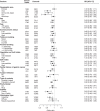Tea consumption and gastric cancer: a pooled analysis from the Stomach cancer Pooling (StoP) Project consortium
- PMID: 35610368
- PMCID: PMC9381730
- DOI: 10.1038/s41416-022-01856-w
Tea consumption and gastric cancer: a pooled analysis from the Stomach cancer Pooling (StoP) Project consortium
Abstract
Background: Evidence from epidemiological studies on the role of tea drinking in gastric cancer risk remains inconsistent. We aimed to investigate and quantify the relationship between tea consumption and gastric cancer in the Stomach cancer Pooling (StoP) Project consortium.
Methods: A total of 9438 cases and 20,451 controls from 22 studies worldwide were included. Odds ratios (ORs) and the corresponding 95% confidence intervals (CIs) of gastric cancer for regular versus non-regular tea drinkers were estimated by one and two-stage modelling analyses, including terms for sex, age and the main recognised risk factors for gastric cancer.
Results: Compared to non-regular drinkers, the estimated adjusted pooled OR for regular tea drinkers was 0.91 (95% CI: 0.85-0.97). When the amount of tea consumed was considered, the OR for consumption of 1-2 cups/day was 1.01 (95% CI: 0.94-1.09) and for >3 cups/day was 0.91 (95% CI: 0.80-1.03). Stronger inverse associations emerged among regular drinkers in China and Japan (OR: 0.67, 95% CI: 0.49-0.91) where green tea is consumed, in subjects with H. pylori infection (OR: 0.68, 95% CI: 0.58-0.80), and for gastric cardia cancer (OR: 0.64, 95% CI: 0.49-0.84).
Conclusion: Our results indicate a weak inverse association between tea consumption and gastric cancer.
© 2022. The Author(s), under exclusive licence to Springer Nature Limited.
Conflict of interest statement
The authors declare no competing interests.
Figures




References
-
- Statista. Volume of tea consumption worldwide from 2012 to 2025 (in million kilograms). 2021. https://www.statista.com/statistics/940102/global-tea-consumption/. Accessed 2 September 2021.

